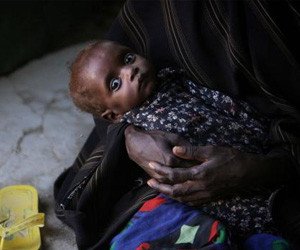A malnourished child waits for emergency medical assistance from the African Union Mission in Somalia (AMISOM), an active regional peacekeeping mission operated by the African Union with the approval of the United Nations. Somalia is the country worst affected by a severe drought that has ravaged large swaths of the Horn of Africa, leaving an estimated 11 million people in need of humanitarian assistance. (UN Photo/Stuart Price)
MOGADISHU, Somalia, Aug. 5 (UPI) -- Famine relief efforts in Somalia are hampered more by delays in procuring food and funds than by militants banning access to certain areas, organizers said.
Staff members at relief organizations said a huge problem in responding to the crisis is the time it takes to buy food abroad and ship it to the hardest-hit areas, The Guardian reported Friday.
"The limits on our action are more on the side of logistics than access," said Anna Schaaf, spokeswoman for the International Committee of the Red Cross in Nairobi in neighboring Kenya. "To purchase 3,000 tons of food and get it there is a long process."
UNICEF officials said it takes 20 days to procure soy-blend products from India and double the time from Europe. Despite sending 11 flights to Somalia this week, the U.N. agency said its efforts were "still not to scale and not enough."
Tony Burns, director of operations for Saacid, the oldest non-government organization in Somalia, told The Guardian that despite the size of the crisis "funding is still very difficult to get."
The militant organization al-Shabaab makes responding difficult because it has banned some relief organizations -- such as the United Nation's World Food Program -- from territory it controls. The militant group controls parts of southern Somalia, where the main famine zone is. UNICEF, ICRC and Saacid are not barred by al-Shabaab.
"Al-Shabaab is an issue in responding to the famine," Burns said, "but for us it's more about finding the resources so we can help people."















